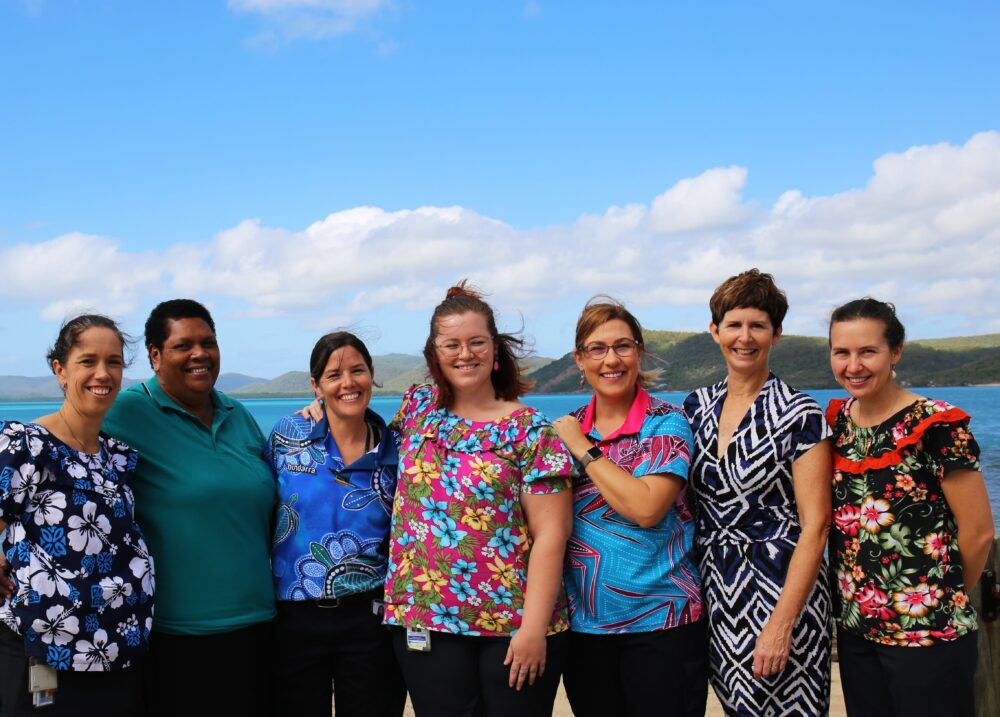Griffith University’s Midwifery team is working with rural communities throughout Australia to help develop the rural, remote and regional midwifery workforce by offering an innovative Bachelor of Midwifery and fully online postgraduate Primary Maternity Care programs. Our Head of Midwifery, Professor Jenny Gamble, recently travelled to Thursday Island in the Torres Strait to connect with the Griffith students and health services professionals in the area.
 Midwifery is a profession that transcends borders and this is particularly important in remote and rural communities, with their strong cultural traditions around birth in the community. There are currently four Primary Maternity Care students on Thursday Island and they have re-designed maternity services to now only offer a continuity model providing over 300 women from 14 outer islands as well as 5 communities on the Northern Peninsula Area with a named midwife. Clinical Midwife Consultant and Master of Primary Maternity Care student, Gemma MacMillan says, “We feel so knowledgeable and empowered by the PMC program and I really do believe you [Griffith] are providing the framework for midwives to continue to fight and advocate for the models of care that give women the best possible outcomes. This course [PMC] has answered for me so many burning questions and that is why I encourage my colleagues to sign up and see what it’s all about.”
Midwifery is a profession that transcends borders and this is particularly important in remote and rural communities, with their strong cultural traditions around birth in the community. There are currently four Primary Maternity Care students on Thursday Island and they have re-designed maternity services to now only offer a continuity model providing over 300 women from 14 outer islands as well as 5 communities on the Northern Peninsula Area with a named midwife. Clinical Midwife Consultant and Master of Primary Maternity Care student, Gemma MacMillan says, “We feel so knowledgeable and empowered by the PMC program and I really do believe you [Griffith] are providing the framework for midwives to continue to fight and advocate for the models of care that give women the best possible outcomes. This course [PMC] has answered for me so many burning questions and that is why I encourage my colleagues to sign up and see what it’s all about.”
Prof Jenny Gamble joined Gemma and her fellow students and midwives, Bec Rooney, Hannah Bettison and Martha Wood while on Thursday Island to discuss transforming maternity services in the Torres Strait, and explore opportunities for local people to study midwifery in their community. Prof Jenny Gamble says, “Griffith plays an important role in preparing midwives for the future. Our programs and research are tailored to ensure the provision and promotion of continuity in midwifery care. We’re committed to providing support to rural and remote areas of Australia and growing the First Peoples midwifery workforce”.
Midwifery is a profession that promotes connection and relationship, not just with the families they assist, but within the broader community, the wider health care team, and students. Newly appointed educator for the area Bec Rooney says, “I am so grateful we have our network of beautiful midwives both here on the Island, as well as through our PMC studies.” The midwives on Thursday Island come from many different countries and have had different journeys, but one thing they do share is a passion for their community. Midwifery manager Gemma says, “Where we currently are is a really good starting point,” regarding their work to establish Midwifery Group Practice (MGP) in the Torres Strait, “but it is not as far as we can go. The next stage needs to be community-led and I see this happening via Indigenous midwives.”
 During her visit, Jenny met with a range of health professional and community members including TI Elder Auntie Margie, who gained midwifery experience working in hospitals around Australia before returning to Thursday Island. Auntie Margie spoke about the need for women to feel comfortable in communicating through every step of the journey. “Sometimes the mothers will speak to me to tell me they need something or to ask about something the staff have told them,” she says, “I make sure I help explain things, but then I tell them they need to speak up. They need to be comfortable telling the midwives, nurses and doctors when something is wrong or they don’t understand something because we all work together for the health of the baby.” As more women are now accessing their own midwife and building relationships things will improve, but as Gemma says to make a real change we need to recruit indigenous midwives.
During her visit, Jenny met with a range of health professional and community members including TI Elder Auntie Margie, who gained midwifery experience working in hospitals around Australia before returning to Thursday Island. Auntie Margie spoke about the need for women to feel comfortable in communicating through every step of the journey. “Sometimes the mothers will speak to me to tell me they need something or to ask about something the staff have told them,” she says, “I make sure I help explain things, but then I tell them they need to speak up. They need to be comfortable telling the midwives, nurses and doctors when something is wrong or they don’t understand something because we all work together for the health of the baby.” As more women are now accessing their own midwife and building relationships things will improve, but as Gemma says to make a real change we need to recruit indigenous midwives.
Seeing the work that our Griffith midwives are doing in conjunction with other health professionals in the area is inspiring and Professor Jenny Gamble will be working with the University and our students to ensure that together we provide the best outcomes possible for women and babies in remote communities. This is just one example of midwifery transcending boarders and why we’re constantly in awe of our students.



